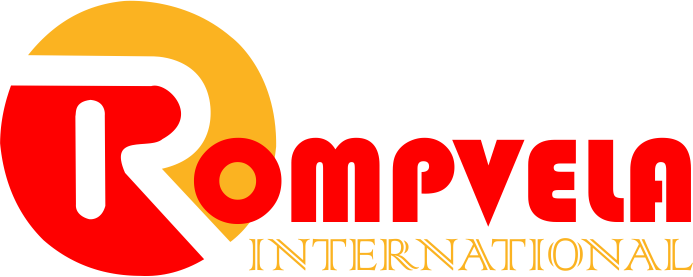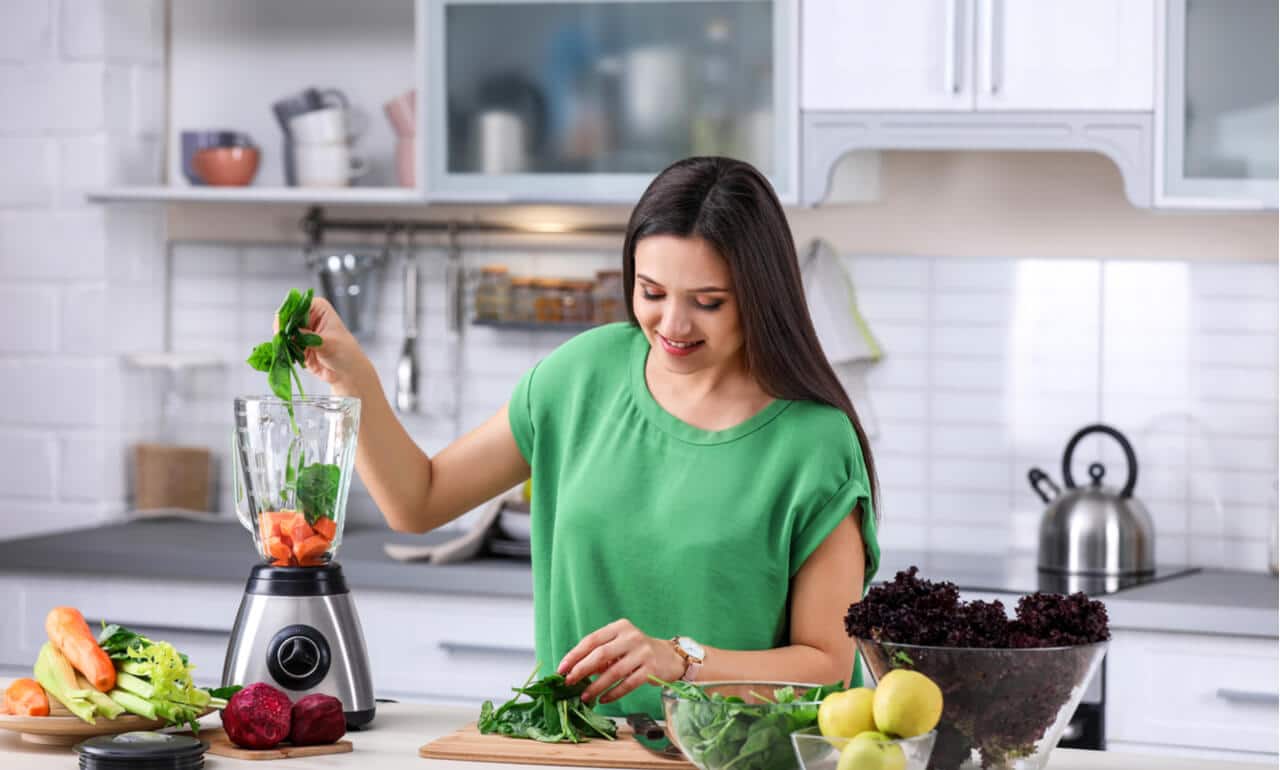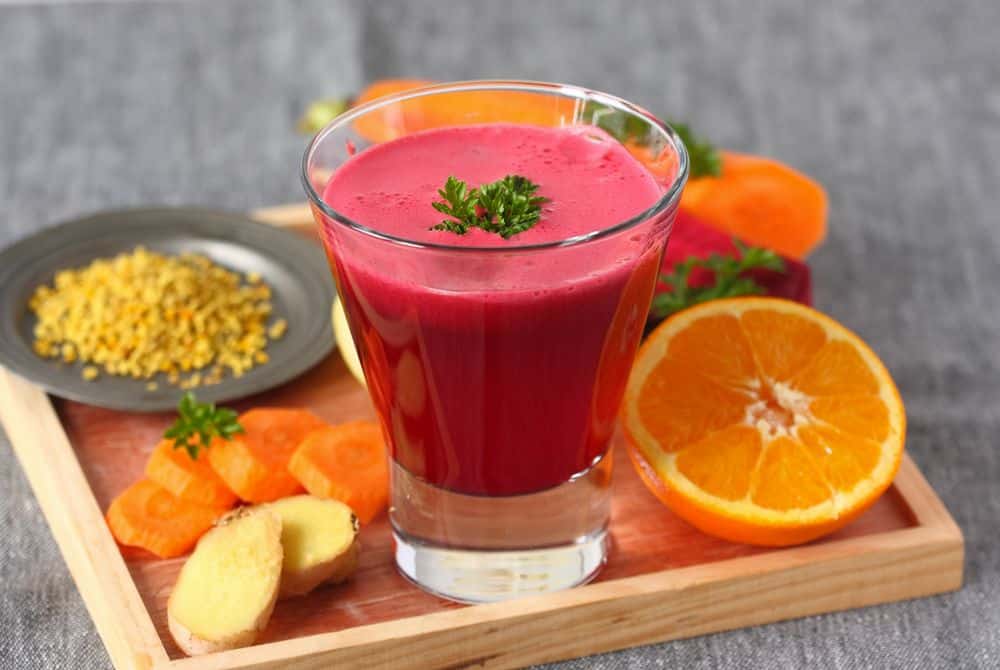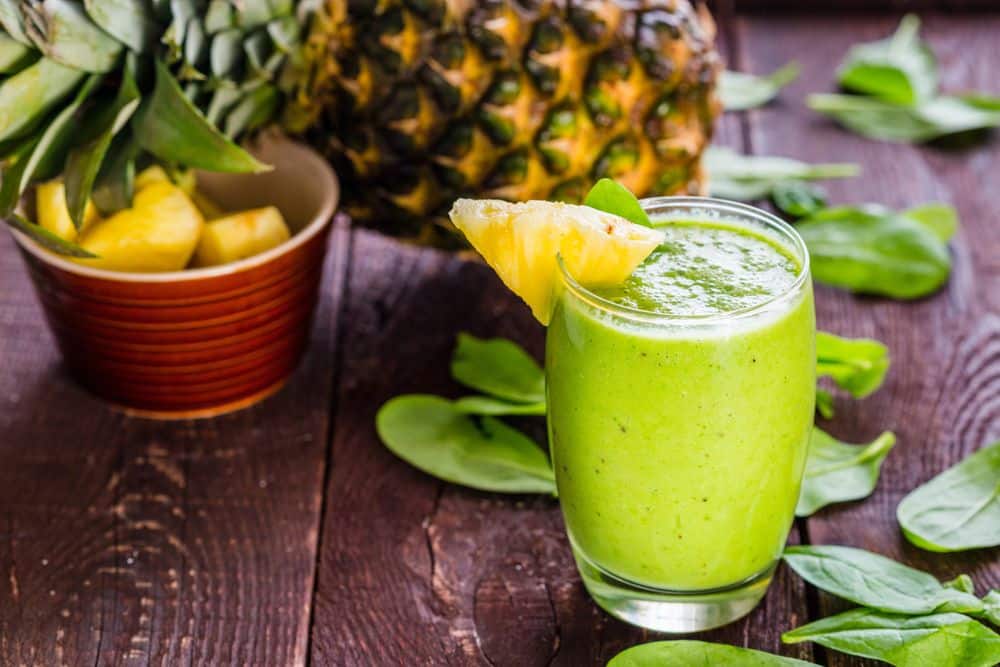[ad_1]
Anaemia is one of the most prevalent nutrient deficiencies worldwide, especially among women. In most cases, the deficiency of iron leads to anaemia. Therefore, a healthcare expert will advise you to take iron supplements. However, in many circumstances, simply increasing your dietary iron consumption through iron-rich drinks is sufficient to restore your body’s iron level.
Unfortunately, our busy schedules and hectic lifestyles prevent us from taking adequate nutrition through our meals. Therefore, we prefer snacking on foods that are ready to eat. However, these foods are unhealthy and pose health risks. But, we can quickly fulfil our body’s iron requirements by having iron-rich foods in the form of liquids. This article will help you find out the best iron-rich drinks that you can consume to meet your iron requirements.
Iron Deficiency
According to the National Family Health Survey, nearly 50% of Indian women are iron deficient. Low iron consumption indicates a lack of haemoglobin synthesis, which can obstruct oxygen flow to the brain. As a result, it causes extreme pressure on the brain, leading to severe headaches. Iron deficiency affects both men and women in equal amounts. However, it is a severe concern for women because they lose additional iron through blood loss during menstruation. Thus, it is critical to consume plenty of iron, which you can obtain from various fruits and vegetables.
Recommended Daily Iron Requirement
People with anaemia should consume 100–200mg of iron each day. It is more than what you may get from a standard daily multivitamin or food. Therefore, a doctor will usually prescribe iron supplements or elemental iron to treat anaemia. However, you can still increase your iron levels through food and beverage intake.
There are several forms of anaemia, each with its specific treatment options. Although foods will help you fulfil your iron requirements, you should consult your doctor to get the proper treatment. It will help acquire an appropriate diagnosis and treatment. But, it is best to consume iron-rich foods and drinks for those who are borderline anaemic or those who are not anaemic. It is a preventive measure to avoid the possibility of anaemia or iron deficiency.
7 Iron-Rich Drinks to Boost Your Health
Prune Juice
Dried plums, also known as prunes, are a rich source of plant-based iron. Data suggests that 240 ml (one cup) of prune juice provides 1.18mg of iron, 17% of the daily requirement. Besides its iron-rich content, prune juice helps boosts energy. In addition, the consumption of prune is healthy for people with diabetes because it doesn’t lead to a spike in blood sugar. It also helps prevent stomach-related issues like constipation.
Although consuming prune juice helps fulfil daily iron requirements, you should also note that plant-based iron isn’t as bioavailable as animal iron or iron from supplements. Therefore, it’s preferable to regularly consume a balanced diet with a mix of plant and animal-based iron sources for healthy iron levels.
Beetroot Juice
Beetroot is high in numerous essential nutrients like folate, manganese, potassium, iron, betaine, and vitamin C. The juice aids in the removal of toxins from the liver. Additionally, it improves the oxygen usage of our red blood cells.
Beetroot contains minerals that repair the blood cells. As a result, it increases the oxygen supply in the body. One hundred grams of beetroot contains 0.8mg of iron. You can add toppings of carrot, orange or amla to your beetroot juice to enhance the flavour and nutrient content.
Pea Protein Shakes
Protein powders, such as whey, have less iron than pea protein powder. For example, a 20gm intake of organic yellow pea protein provides 30% of the daily value for iron. However, the same amount of whey protein offers only 13%. Therefore, pea protein powder can be an excellent choice to fulfil your iron requirements.
You can consume pea protein in various ways, including shakes and smoothies. Use it in drinks with other iron-rich ingredients for a boost of iron. Try to consume unsweetened or flavoured pea protein. It helps prevent excess calorie consumption, which may add to weight gain.
Spinach, Cashew, Coconut and Raspberry Smoothie
Smoothies are a quick and easy way to get iron from multiple sources. The spinach, cashew, raspberry, and coconut smoothie is a delicious way to get more iron in your diet. Non-heme iron, also known as plant-based iron, is abundant in these foods.
Two tablespoons (32gm) cashew butter offers 11% of the daily required iron. It’s a great addition to a smoothie because of its creamy texture. The smoothie also contains a lot of plant-based protein. For example, per cup (140gm) serving of frozen raspberries provides 6% of the daily required iron. In addition, spinach is one of the best sources of iron and impart several health benefits.
Pumpkin Juice
Pumpkin is a powerhouse of antioxidants and minerals that help improve your overall health. In addition, pumpkin seeds are one of the most significant sources of iron. Although you can eat pumpkin seeds as a snack, a delicious way to consume them is by adding them to your smoothie. In addition, you can reap all the benefits of pumpkin by having pumpkin juice. You can make pumpkin juice using the following steps:
- Put chopped pumpkin in a blender.
- Puree the pulp, and drink it right away.
Mulberry Smoothie
Mulberries are high in vitamin C and iron, as one cup of mulberry extract contains 2.59mg of iron and 51mg of vitamin C. At the same time, vitamin C in mulberries help absorb iron from other food sources. Unfortunately, mulberries aren’t always the most accessible fruit in the supermarket. However, if you get them, use them to prepare this smoothie to get an adequate dose of iron and vitamin C. You can make the mulberry smoothie by following these simple steps:
- Combine mulberries, bananas, milk, oats, chia seeds, and Greek yoghurt
- Blend them into a delicious morning smoothie.
The smoothie will keep you full while also providing enough iron.
Flaxseed and Sesame Smoothie
People have been using flaxseeds for centuries to get their multiple health advantages. For example, flax seeds are high in iron and help produce haemoglobin. In addition, flax seeds help strengthen our bones when consumed regularly.
Sesame seeds contain a delicious nutty flavour and are high in iron. As per the USDA, the seeds have 1.31mg of iron per tablespoon and several other minerals like copper. They’re also high in phosphorus, vitamin E, and zinc. Follow these simple steps to make a flaxseed and sesame smoothie:
- Add some milk and honey to a blender
- Put some flax seeds and sesame seeds into the mixture
- Blend till it turns smooth and thick
- Drink fresh
Healthy Iron-Rich Drink Recipes
1. Beet and Orange Smoothie
Ingredients
- Orange: 1 (peeled)
- Beet: ½ cup
- Frozen strawberries: 1 cup
- Apple: 1
- Water: ½ cup
Method
- Blend the ingredients until smooth
- You can add lemon juice to give it a tangy flavour.
2. Spinach and Pineapple Smoothie
Ingredients
- Spinach leaves: 2 cups
- Peeled orange: 1
- Pineapple: ½ cup
- Lemon juice: ½ teaspoon
Method
- Mix and blend the ingredients to get a thick smoothie
- Sprinkle some sesame seeds to enhance the iron content and give a crunch
Juices for Anaemia
Since juices differ from combining fruits and vegetables into a smoothie, the nutritious value of the meal gets affected. Smoothies contain entire fruits and vegetables that you mix. In contrast, juices involve crushing the fruit and vegetables. As a result, juices release only the liquid and leave the pulp of the food behind. Indeed, it’s smooth in texture, but the fibre content changes significantly. Furthermore, juices do not have enough vitamin C for an iron boost.
The nutritional content of juices purchased at local grocery shops usually is labelled, but storage time and temperature can affect it. For example, after 31 days of opening the juice and storing it in the fridge, the vitamin C level drops by 60 to 67%. Therefore, preparing juice at home is better to achieve the taste and texture you like while also getting the vitamin C you require.
Foods to Avoid
Tannins
Tannins in tea and caffeine prevent iron from being absorbed from iron-rich diets. Therefore, try not to drink tea or coffee while having iron-rich foods.
Calcium
Excessive calcium can prevent iron from getting absorbed from iron-rich diets. Thus, avoid consumption of dairy products while having an iron-rich meal.
Vitamin C
Consume iron-rich foods with a high vitamin C content to enhance iron absorption. These include oranges, pineapple, mousmi, amla, lemon, broccoli, or strawberries.
Heme and Nonheme Iron Foods
It is advisable to eat non-heme iron foods (plant sources) with heme-iron foods. Non-heme foods include beans, dark leafy greens, beets, moringa leaves, almonds, sesame seeds etc. On the other hand, Heme-iron food has animal sources like meat, fish, and poultry.
Conclusion
Fortunately, there’s an extensive list of iron and vitamin C-rich substances that taste delicious in liquid form. However, you should avoid black and herbal teas, coffee, and alcohol. Their plant components can prevent iron absorption. If you have an iron deficiency, include these healthy juices in your diet, but remember to drink them in moderation. Always get medical advice before incorporating any new foods into your diet.
Frequently Asked Questions (FAQs)
Q. What drink is good for iron deficiency?
A. Smoothies and shakes are a quick and easy way to get iron from multiple sources. Examples are spinach, cashew, raspberry smoothie, mulberry smoothie, beet and orange smoothie. Moreover, juices like prune juice, beetroot juice, pumpkin juice are good for iron deficiency. Choose a drink with orange, tomato or grapefruit juice as they are rich in vitamin C and increase the absorption of nonheme iron.
Q. Which juice is rich in iron?
A. Juices like prune juice, beetroot juice, pumpkin juice and spinach juice are rich plant-based iron sources. They are also a powerhouse of various vitamins and minerals, which increase your body’s healthy iron levels. Adding these juices to your diet with a mix of animal-based iron sources can help maximise the benefits.
Q. How can I get 8 mg iron a day?
A. Several foods can help you get 8mg of iron per day. For example, you can get 8 mg iron a day by adding clams, tofu, sardines, spinach, soy, clams, dried fruits, and legumes to your diet. In addition, you can increase your iron levels through your beverage intake. So consume iron-rich juices and smoothies like prune juice and beet. In addition, you can have an orange smoothie, which contains vitamin C required for iron absorption. It is preferable to consume a balanced diet regularly.
Q. How can I increase my iron naturally?
A. You can increase your iron naturally by regularly eating iron-rich foods like meat, tofu, legumes, and spinach. In addition, you can get a healthy dose of vitamin C from fruits such as oranges, kiwi fruit, and limes, which regulates iron absorption. Also, avoid drinking tea or coffee while having iron-rich foods as the tannins in them prevent iron from being absorbed.
Q. What fruit is highest in iron?
A. Prunes and mulberries have the highest concentrations of iron per portion. In addition, apricots, raspberries, avocados and olives have a considerable amount of iron. These fruits also contain antioxidants and various beneficial nutrients that promote health.
Q. Do bananas have a lot of iron?
A. Bananas have very little iron, approximately 0.5 mg per 100 g. This low amount of iron is insufficient to meet your daily iron requirements. Therefore, bananas alone are not the ideal fruits for iron. You can eat other fruits such as raisins and prunes with more iron.
Q. Are eggs high in iron?
A. Eggs contain 2.73mg of iron per 100g of serving. Egg yolks contain both heme and nonheme iron. They also possess high-quality protein, essential vitamins and minerals. Moreover, eggs increase the levels of high-density lipoprotein (HDL) or “good” cholesterol in the body.
Q. What food is highest in iron?
A. The redder the meat, the more iron content it has. Hence, red meat has the highest iron content. Other foods such as clams, oysters, lentils, spinach, beetroots, fortified cereals and apricots are also high in iron. Moreover, you can consume certain drinks regularly to obtain your daily iron requirement.
Q. Is oatmeal rich in iron?
A. Yes, oatmeal is rich in iron. However, oatmeal contains high nonheme iron levels. Hence, you should eat it with a diet that helps increase its absorption, such as vitamin C rich fruits. In addition, it contains a wide range of vitamins, minerals, antioxidants, protein and complex carbohydrates, which are beneficial for your health.
Q. Is ginger tea good for anaemia?
A. Yes, ginger tea is used as a traditional remedy to fight anaemia. Since it contains a high vitamin C and iron content, it aids in red blood cell production. As a result, it helps increase haemoglobin in the body. In addition, ginger tea offers health benefits such as improving immunity, fighting infections and reducing stress.
Q. Is Honey Good for iron deficiency?
A. Honey is an excellent source of iron. It also contains elements like copper and manganese, which aid in erythropoiesis. That makes it a potent weapon against anaemia. In addition, you can eat honey with apples or bananas to help keep the haemoglobin and red blood cells well balanced, thus treating iron deficiency.
Q. Is peanut butter high in iron?
A. Peanut butter is high in iron, about 0.57mg per tablespoon. It is also a rich source of healthy fats and protein. You can spread some peanut butter on your toast for breakfast, pairing it with fresh orange juice. Peanut butter and apple also make an excellent combination for a healthy snack.
Q. How can I raise my iron levels quickly while pregnant?
A. Due to the various changes in the body during pregnancy, there is an increased demand for more red blood cells. You can quickly raise your iron levels by drinking iron-rich drinks like Aviva Romm’s iron tonic, spinach-cashew-raspberry smoothie, pumpkin juice, mulberry smoothie, and Prune juice. Eating dark green leafy vegetables, legumes, broccoli, fish, meat, and fresh citrus fruits will also help raise your iron levels.
[ad_2]
Source link




